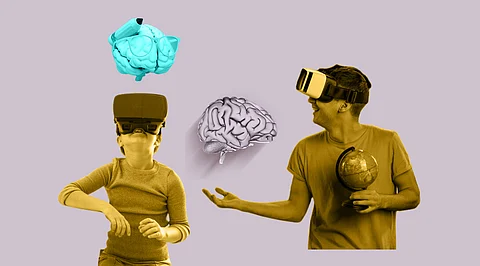

Technologies that are constantly evolving have been driving transformation in all aspects of life. AI and Metaverse, among other technologies in the education sector, are significant in this digitalization era. Both technologies AI and Metaverse in the education sector are making major transformations by helping students' individualized and interactive learning.
In the education sector, Metaverse allows students to attend virtual classes remotely while experiencing elements of the real classroom. AI, on the other hand, has enabled students to customize their approach to educational programs based on their individual preferences. Education institutions and technology companies are collaborating to remove physical barriers and make classrooms more immersive, engaging, and communicative. With AI, VR, and AR technologies, the metaverse could become the next big offering in terms of learning opportunities for people all over the world. Let us now look at how AI and Metaverse are transforming the education sector with an expected CAGR of 40.3% between 2019 and 2025.
With the advent of artificial intelligence, students can now target a personalized learning experience for themselves. It collects data from students about their understanding and level of perception and then creates a learning path for them. Students can also use artificial intelligence to track their real-time progress and take specialized classes or practice tests based on it.
AI enables educators to share digitized versions of textbooks and resources with students. As a result, anyone in the world can access their favorite lessons. Education is no longer confined by four walls. Furthermore, one can rely on AI to have their lessons translated into different languages to facilitate education.
The use of a metaverse in education can improve focused learning. Badges and other forms of recognition keep learners motivated and encourage them to stay focused on completing the assigned tasks. Students, for example, can explore different geographical areas in the metaverse to learn about the features and environment of the locations. The learners can then create avatars based on the culture of the location.
Students can focus on improving their learning experiences by using Metaverse's virtual 3D classroom configuration. Student engagement has increased as a result, particularly with AR and VR, facilitating broader comprehension and improving memory recall for difficult or abstract concepts. The interactive curriculum, self-paced learning, and micro-learning have also been enabled by digital classrooms.
AI makes language learning more accessible to everyone in the metaverse. People in the metaverse, for example, will use AI-powered language-learning chatbots to learn foreign languages as language chatbots become more intelligent. Direct interaction with bots in the form of questions and customized answers facilitates learning through communication and can be an extremely effective method of learning a foreign language.
Artificial intelligence, virtual reality, and augmented reality technologies can improve multilingual accessibility for learners anywhere in the world. Technologies such as speech-to-text, text-to-speech, and machine translation enhance the learning process and create more immersive learning environments. AI can process multiple languages concurrently and provide real-time translations, allowing students to interact with materials in the language of their choice.
The metaverse is redefining traditional methods of education by involving students in hands-on activities that would otherwise be risky and difficult in a real-world setting. It assists students in better understanding theories and refining their skills to prepare them for real-world endeavors. Within a metaverse, students can perform complex surgeries or dangerous explosive experiments without endangering anyone's life.
One of the most significant advantages of artificial intelligence is task automation. Educators must manage a variety of administrative tasks, such as organizing teaching materials and resources, filling out student information, preparing progress reports for students, keeping track of their attendance, and so on. Managing all of these non-teaching activities is time-consuming.
AI enables educational institutions to administer virtual exams. Online testing allows students to take exams from anywhere in the world. Also, because teachers are guided by AI, preparing question papers becomes far too simple. Because of artificial intelligence, such online examinations are more secure than offline ones, as AI provides teachers with various configurations and settings for preparing question papers.
With internet-enabled techniques, knowledge can be easily made available to a larger audience. Once created, courses can be used by multiple learners, saving time and money. Personalized search results and improved socially collaborative tools will understandably provide individualized learning paths.
Join our WhatsApp Channel to get the latest news, exclusives and videos on WhatsApp
_____________
Disclaimer: Analytics Insight does not provide financial advice or guidance. Also note that the cryptocurrencies mentioned/listed on the website could potentially be scams, i.e. designed to induce you to invest financial resources that may be lost forever and not be recoverable once investments are made. You are responsible for conducting your own research (DYOR) before making any investments. Read more here.
